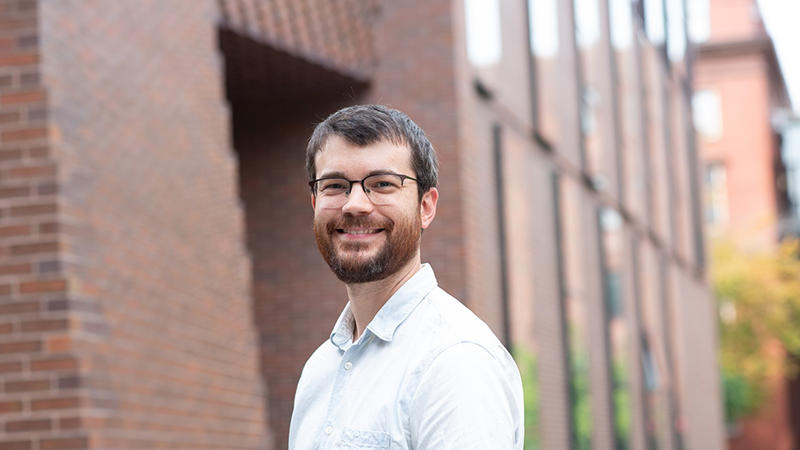I study how learning works in the brain. I draw inspiration from machine learning algorithms that are mathematically analogous to biological learning processes. Then I try to understand how elements of these learning algorithms can be implemented in biological hardware. My current work investigates how a machine learning algorithm called temporal difference learning may be accomplished through the interactions of multiple neurobiological parts: dopamine neurons, the neurons they release dopamine onto, and the intricate neural circuitry connecting them. I draw inspiration from theory but am mainly an experimentalist, working with mice and using the remarkable tools we now have to both control and record specific signals in their brains.
Photo by Celia Muto
What are the big questions driving your research?
What gives animals their remarkable ability to learn quickly and efficiently from experience? How much of this is built into the brain’s hardware through evolution, versus learned anew during every individual life? The brain contains many different learning systems acting in parallel—how do they co-exist, and how do they interact? Are they redundant, independent, mutually beneficial? Can we find common themes underlying the brain’s many learning systems, or principled explanations for how and why they differ?
What is the first experiment you remember doing?
For my middle school science fair, I did an experiment to determine the optimal amount of light per day for growing plants. I set up tomato plants in my parents’ basement with grow lamps, and had groups exposed to the lamps for 6, 12, or 24 hours a day. I was expecting that the 12 hr/day group would grow best (plants need a good night’s sleep, right?), but it was the 24 hr/day group!
What is the trait you most admire in others?
This is a tough one. There are so many. This one is probably not my top overall, but I really admire a certain kind of adaptability: The ability to adapt to unforeseen challenges or disappointments and figure out the best way forward without getting stuck in the past.
What are your hopes for the future?
I hope to run a lab and will be going on the job market in the coming year. Two things are really important to me: Doing rigorous, incisive experiments that can be trusted and bring clarity to the field; and building a supportive lab environment that empowers people to do their best work, while also recognizing and embracing their different backgrounds, needs, strengths, and goals.
What are your hobbies outside of the lab—current, past, or future?
I’m a pretty serious pianist, mainly jazz but also classical. I did a Master’s degree in Jazz Piano Performance at the New England Conservatory (many years ago now…). I keep it up on my own and still perform from time to time. It feeds my soul like nothing else does!
Since starting my postdoc, I’ve become an enthusiastic volleyball player. I was recruited to play in the Rhino cup by my labmates and fell in love with it. It’s a great way to get outside, get a bit of exercise and meet people from around the Harvard community.
My main extracurricular activity these days is raising my two kids, Miles and Margaret!

